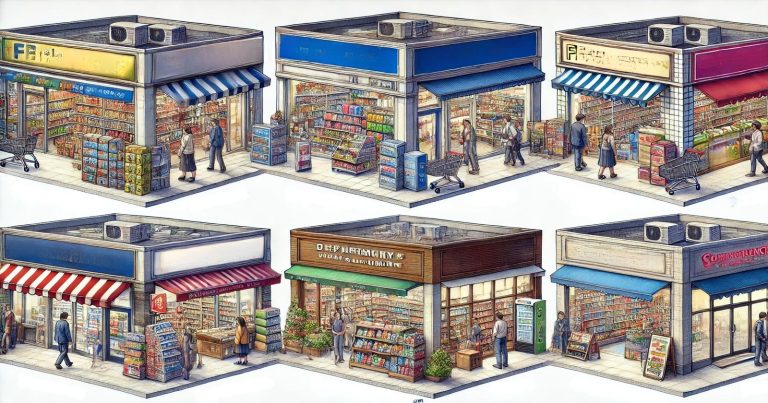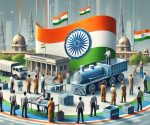Fixed shop retailers are business persons selling goods from a fixed location. Unlike itinerant traders who always move from place to place, fixed shop retailers operate from one specific location within a market or shopping area. They serve the customers regularly, so the experience is bound to be homogenous.
Fixed shop retailers do business from permanent shops in markets, shopping complexes, or standalone locations. They do not move from place to place like the street vendors or hawkers. They have an area where they can stay and maintain their customer base steadily. Fixed retail shops offer various groceries, clothes, electronics, and household items. They ensure reliability, better-quality products, and confidence in customers’ minds.
The fixed shop retailer concept plays the most important role in the economy. They create employment and high economic growth, providing most of the essentials and services. Be it small or large scale, retailers give the basic premise to the retail business. In this article, some of the characteristics of fixed shop retailers, along with the types of retailers and the significance of these types of retailers in the retail market, will be described.
Who are Fixed Shop Retailers?
Fixed shop retailers are business persons selling goods from a fixed location. Unlike itinerant traders who always move from place to place, fixed shop retailers operate from one specific location within a market or shopping area. They serve the customers regularly, so the experience is bound to be homogenous.
They are small-scale fixed shop retailers like neighbourhood grocery stores or large-scale fixed shop retailers like supermarkets and departmental stores. They allow building a reputation due to their fixed location, and customers remain loyal to the shop. Other services offered are credit facilities, home delivery, and after-sales support.
Fixed shop retailers are crucial in the urban and rural markets. They provide an assortment of products and services, thereby making daily needs easily accessible to a customer. Their fixed presence in a market instils consumer confidence, and people purchase from them again and again.
Characteristics of Fixed Shop Retailers
Numerous characteristics of fixed-shop retailers set them apart from itinerant traders. The most distinguishing factors include their permanent location, variety of products, and customer service, hence being part and parcel of the retailing sector. Features of Fixed Shop Retailers are as follows:-
Permanent Location
A shop retailer sells from a fixed location, either a market, shopping centre or a standalone shop. Their fixed locations don’t change often. This helps to locate the business easily, attracting customer loyalty as customers can know about them more than once.
Huge Product Line
They sell all sorts of items, including groceries, clothes, electronics, and furniture. Some sell specialised things, while others sell many things under one roof.
More Investment
A fixed retail shop requires more investment than street vendors or hawkers. Owners invest in the shop’s rental, furniture, stock, and workforce. That level of investment stabilises them far more than vagabond sellers.
Customer Credibility
Since the fixed shop retailers are stable, the customers trust them more than the mobile vendors. They assure quality products, give warranties, and provide after-sales services. Such reliability builds long-term relationships with customers.
Credit Facilities and Home Delivery
Most fixed-shop large retailers give credit to trusted customers. They also provide customers with products to take home, making them much more convenient. Such benefits create an upper hand to the giant shops, keeping away small-time vendors.
Fixed Shop Hours
Fixed shop retailers follow fixed business hours. They are visited at specified times. Customers feel that they are convenient and easy to access. They do not depend on market conditions, which would appear unpredictable.
Improved Display and Presentation
They have a cost for decorative displays and proper fixing of commodities. This would make them available to the consumer and increase the scale by which the consumers could find what they need.
Legal Requirement
The government governs the fixed shop retailers. The retailers acquire licenses for the business and pay taxes. Besides, they are also covered by consumer protection laws. This would give them a legal status, making them legitimate in the market.
Types of Fixed Shop Retailers
Fixed shop retailers are permanent retail trading businesses located at fixed locations. They don’t move about like other kinds of retailers as they move from place to place. As a result, there exists stability with the fixed place and can support a stable customer following plus the display of diverse commodities and services. From the smallest neighbourhood shops to big supermarkets and department stores, all of these fall under the category of fixed retail shops.
According to the size of their businesses, fixed shop retailers can be broadly distinguished into two types. One such type of fixed shop is a small retailer, and the other fixed shop is a large retailer. Small-scale fixed shop retailers work in the local neighbourhood, selling a very restricted variety of products. On the contrary, enormous shops of large-scale fixed shop retailers undertake business in huge quantities. This division provides an idea about their specific nature and functions in retail.
In this paper, we will discuss small-scale fixed-shop retailers and large-scale fixed-shop retailers.
Fixed Shop Small Retailers
Small-scale fixed shop retailers mean doing business at reduced scales, targeting to fulfil local communities’ everyday needs. This type of trade requires minimal investment. The stock maintained is lower; sometimes, the owner’s family or even a few employees operate these businesses.
General Stores
General stores are small retail shops selling all kinds of products that people need in their day-to-day lives. They are generally located in residential areas, making easy access to essential goods available. Customers prefer general stores because of the convenience, friendly service, and credit facilities offered to regular buyers.
These will involve foodstuffs, toiletries, household accessories, soft drinks, soaps, and detergents. Such stores operate throughout the late night hours of the day simply because they meet the customers’ various daily needs and demands. The goodwill of the personal relation between shop owners and clients effectively helps to enable them.
Speciality Shops
Specialised stores that sell special types of goods such as shoes, jewellery, toys, apparel, electrical products, or gift products are usually located in the business districts or shopping streets and get the most clients.
The specialty shops are advantageous because they offer choices within one product category. For instance, a shoe shop offers various brands, styles, and footwear sizes. Customers prefer specialty shops because they can get quality products and expert advice in one place, saving time and effort.
Street Stall Holders
Street stall holders are small retailers that lay down stalls in crowded areas such as market streets, railway stations, and bus terminals. These retailers sell cheap merchandise from soft drinks, toys, wallets, mobile accessories, and fashion pieces.
These retailers sell at cost their products bought from local wholesalers. As they incorporate very low overhead costs, these retailers sell commodities at competitive prices. They are convenient for customers since they sell products in places where people regularly pass. by
Shops Selling Second-HandGoods
Used goods shops sell pre-owned or used goods, such as furniture, cars, books, clothing, and appliances. Customers in shops are buyers who want products at a relatively cheaper price. They are particularly popular with customers seeking bargain prices or collectors seeking an antique or some rare items.
The success of second-hand shops depends on the quality and prices of their products. Some specialise in certain items, for instance, antique furniture or refurbished electronics, while others sell a mix of merchandise. Their popularity among customers lies in the fact that they offer affordable alternatives to expensive new products.
Fixed Shop Large Stores
Fixed shop large retailers deal in a more significant volume of quantities. It requires a higher investment and deals with a wide clientele. They deal in multiple types of goods and services. It is quite famous among consumers looking for more products under one roof.
Departmental Stores
A departmental store is a large retail concern that sells different things in different sections or departments. It is a one-stop shop that separately offers clothing and electronics, home appliances, groceries, and cosmetics in different store sections.
The most important strength of departmental stores is that they are very systematic. All the products are kept in different sections, so the customer can easily get what he needs. They provide a very convenient shopping experience and sometimes home delivery, credit facilities, and schemes for customer loyalty.
Chain department stores are Big Bazaar and Central in India and Macy’s and Harrods internationally. These complexes are located in commercial centres, which are busy marketplaces, so accessibility to many customers is not difficult.
Chain Stores
Chain stores are a group of retail outlets owned and operated by the same company. They share uniform looks, prices, and products at all outlets. Some Indian chain stores are DMart, Croma, and Reliance Digital, while on the international level, it has Walmart and Tesco.
The biggest advantages of chain stores lie in the standardised product and service delivery in all its branches. Each customer is aware of what to expect in each purchase, either in terms of quality or price, regardless of the outlet. Since they buy in large volumes, discounts and other competition prices can easily be afforded in chain stores.
Another huge advantage that chain stores have is to balance losses. If one store is in a bad situation, the profits from the other stores are balanced with it to keep the whole business stable. As such, these stores make branding investments, ads, and loyalty programs to retain customers.
| Feature | Fixed Shop Small Retailers | Fixed Shop Large Retailers |
| Scale of Operation | Small-scale, limited inventory | Large-scale, extensive inventory |
| Investment | Low to moderate | High capital investment |
| Product Variety | Limited product range | Wide range of products |
| Customer Base | Local customers | A large number of customers |
| Technology Use | Basic billing and stock-keeping | Advanced billing, digital payments, and automated stock management |
| Examples | General stores, street stalls | Departmental stores, chain stores |
Difference Between Itinerant and Fixed Shop Retailers
Fixed shop retailers provide reliability, variety, and consistent service, whereas itinerant retailers offer convenience and flexibility. Both types play a crucial role in the retail industry. Fixed shop retailers and itinerant retailers differ in their mode of operation, investment, and product offerings. The table below highlights the key differences:
| Feature | Fixed Shop Retailers | Itinerant Retailers |
| Location | Operate from a fixed place | Move from one place to another |
| Investment | Requires significant investment | Requires minimal investment |
| Customer Base | Steady and loyal customers | Dependent on occasional buyers |
| Product Range | Wide variety of goods | Limited product selection |
| Legal Compliance | Registered business, pays taxes | Often operate informally |
| Examples | Departmental stores, chain stores, general stores | Street vendors, mobile hawkers |
Fixed Shop Retailers FAQs
What are fixed-shop retailers?
Fixed shop retailers are business people who sell their goods from a fixed location. They are not street vendors or mobile traders but operate from a specific shop and regularly serve customers.
What are the characteristics of fixed-shop retailers?
The characteristics of fixed shop retailers are permanent location, higher investment, customer trust, variety of products, and legal compliance. They deliver uniform services and maintain good relationships with customers.
What are the types of fixed-shop retailers?
The fixed-shop retailers are small-scale retailers (general stores, medical shops) and large-scale retailers (supermarkets, department stores).
What is the difference between itinerant and fixed-shop retailers?
Itinerant retailers keep changing locations and selling their goods to many customers. Fixed shop retailers have a permanent location, and the same customers visit them regularly.
Why are fixed-shop retailers significant?
Fixed shop retailers provide availability of necessities, boost local economies, create employment, and deliver dependable customer service. The stability they provide ensures an orderly retail market.


